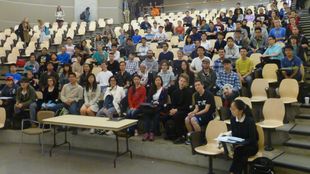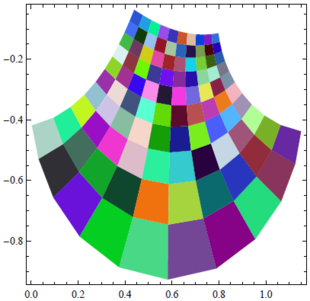14-240/Tutorial-October7: Difference between revisions
From Drorbn
Jump to navigationJump to search
| Line 36: | Line 36: | ||
(2) Let <math>V=\{(a_1, a_2):a_1, a_2 \in R\}</math>. Then <math>\forall (a_1, a_2), (b_1, b_2) \in V, \forall c \in R</math>, define |
(2) Let <math>V=\{(a_1, a_2):a_1, a_2 \in R\}</math>. Then <math>\forall (a_1, a_2), (b_1, b_2) \in V, \forall c \in R</math>, define |
||
<math>(a_1, a_2) + (b_1, b_2) = (a_1 + 2b_1, a_2 + 3b_2)</math> and <math>c(a_1, a_2)=(ca_1, ca_2)</math>. We show that <math>V</math> is not a vector |
|||
space over <math>R</math>. |
space over <math>R</math>. |
||
Revision as of 23:39, 11 October 2014
| |||||||||||||||||||||||||||||||||||||||||||||||||||||||||
Boris
Subtle Problems in Proofs
Check out these proofs:
(1) Let [math]\displaystyle{ W_1 }[/math], [math]\displaystyle{ W_2 }[/math] be subspaces of a vector space [math]\displaystyle{ V }[/math]. We show that [math]\displaystyle{ W_1 \cup W_2 }[/math] is a subspace
[math]\displaystyle{ \implies W_1 \subset W_2 \or W_2 \subset W_1 }[/math].
- Assume that [math]\displaystyle{ W_1 \cup W_2 }[/math] is a subspace.
- Let [math]\displaystyle{ x \in W_1, y \in W_2 }[/math].
- Then [math]\displaystyle{ x, y \in W_1 \cup W_2 }[/math] and [math]\displaystyle{ x + y \in W_1 \cup W_2 }[/math].
- Then [math]\displaystyle{ x + y \in W_1 \or x + y \in W_2 }[/math].
- Case 1: [math]\displaystyle{ x + y \in W_1 }[/math]:
- Since [math]\displaystyle{ x \in W_1 }[/math] and [math]\displaystyle{ W_1 }[/math] has additive inverses, then [math]\displaystyle{ (-x) \in W_1 }[/math].
- Then [math]\displaystyle{ (x+y)+(-x)=y \in W_1 }[/math].
- Case 2: [math]\displaystyle{ x + y \in W_2 }[/math]:
- Since [math]\displaystyle{ y \in W_2 }[/math] and [math]\displaystyle{ W_2 }[/math] has additive inverses, then [math]\displaystyle{ (-y) \in W_2 }[/math].
- Then [math]\displaystyle{ (x+y)+(-y)=x \in W_2 }[/math].
- Then [math]\displaystyle{ x \in W_2 \or y \in W_1 }[/math].
- Then [math]\displaystyle{ W_1 \subset W_2 \or W_2 \subset W_1 }[/math]. Q.E.D.
(2) Let [math]\displaystyle{ V=\{(a_1, a_2):a_1, a_2 \in R\} }[/math]. Then [math]\displaystyle{ \forall (a_1, a_2), (b_1, b_2) \in V, \forall c \in R }[/math], define
[math]\displaystyle{ (a_1, a_2) + (b_1, b_2) = (a_1 + 2b_1, a_2 + 3b_2) }[/math] and [math]\displaystyle{ c(a_1, a_2)=(ca_1, ca_2) }[/math]. We show that [math]\displaystyle{ V }[/math] is not a vector
space over [math]\displaystyle{ R }[/math].

